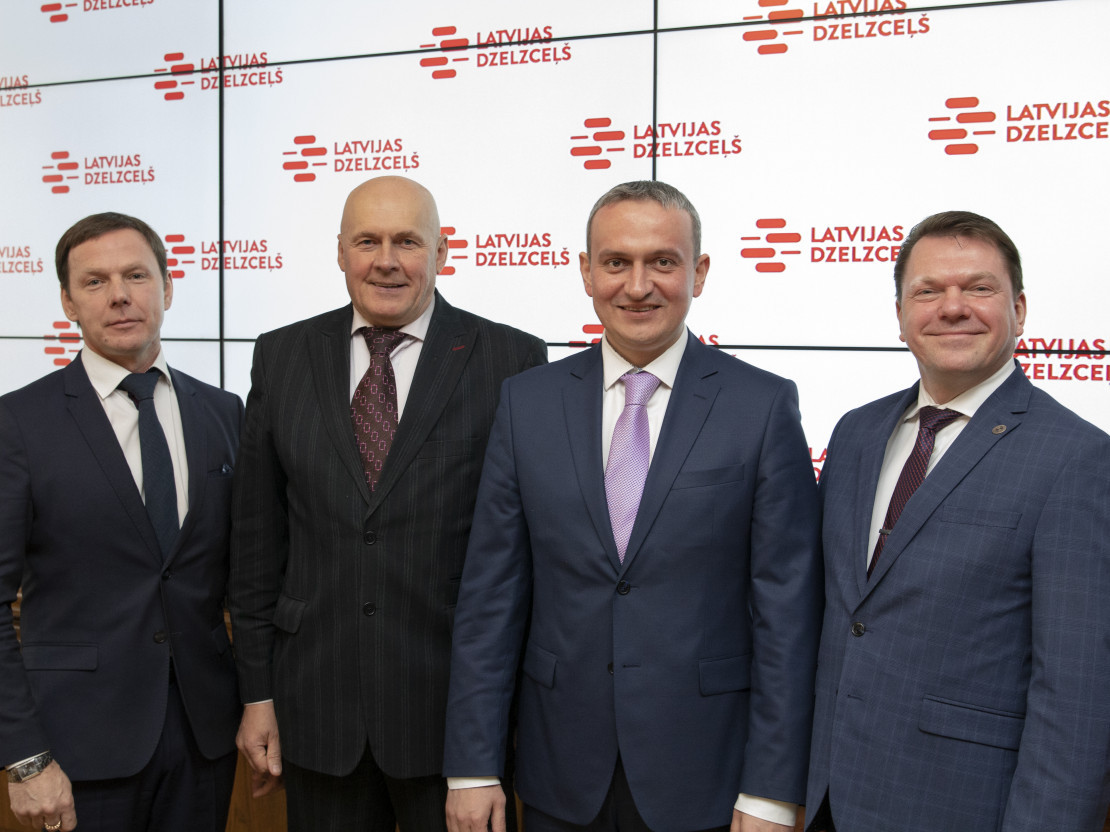
Belarusian petroleum refineries are interested in increase of volumes of transportation of petroleum and petroleum products by using the infrastructure of the SJSC (VAS) “Latvijas dzelzceļš” (LDz), whereas, LDz is ready to accept these cargoes and process them in cooperation with the ports and terminals. This was one of the topics that Mr. Edvīns Bērziņš, President of LDz, discussed on Tuesday, 9 April, during the meeting with Mr. Aleksejs Avramenko, Minister for Transport of Belarus, and Belarusian State Concern for Oil and Chemistry.
Representatives of Belarusian petroleum industry have also paid a visit to explore the opportunities offered by the infrastructure provided by Latvian ports, terminals and railway. Mr. Andrejs Ribakovs, Head of the Belarusian State Concern for Oil and Chemistry admitted that development towards the Northern direction is under consideration in the area of organisation of transportation of petroleum products, and the infrastructure provided by Latvian railway, ports and terminals could be used to achieve this goal. During the conversation, representatives of the industry admitted that joint project with terminals in Latvia could serve as good incentive for organisation of cargo transportation through Latvia.
Latvia is also interested in the cooperation with Belarus in the area of organisation of transportation of petroleum products, and, in order to enhance opportunity to implement it, span of the railway hub Sarkandaugava-Mangaļi-Ziemeļblāzma is currently under modernisation to improve throughput capacity and possibilities for the terminals to accept larger cargo volumes. E. Bērziņš stresses that terminals, ports and railway infrastructure must be ready to accept petroleum product cargoes both in the direction towards Belarus and from Belarus and other European countries.
""Latvijas dzelzceļš" and railway infrastructure is ready for the transportation of petroleum and petroleum products in the traffic with Belarus. I can see an opportunity to create a good offer in this area," President of LDz said to the Belarusian delegation. Majority of the transportation of petroleum and petroleum products using the infrastructure of LDz takes place within the traffic with the company "Naftan", however cargo transport within the traffic with Mozirsk refineries of petroleum products are equally important; they specialise in the products conforming to the requirements of the European Union, thus, these products may be exported to other countries through Latvian ports, stressed E. Bērziņš. He accentuated that major role in organisation of transportation is played by the Indicative Railway Infrastructure Development Plan approved by the Cabinet of Ministers in the autumn 2018 and the multi-annual contract, which was concluded between LDz and the Ministry of Transport, thus providing stability of fee for the use of public use railway infrastructure for the next five years. Whereas, this, in its turn, guarantees transparency for the participants of the transit area and enables them to conclude five-year contracts with the cargo dispatchers.
At the same time, during the meeting, matters related to the electrification of the network of Latvian railway towards the direction of Daugavpils and from Daugavpils to the Belarusian border were discussed. Both parties expressed their readiness to implement cross-border cooperation project in case, if financing of the European Union funds would be available.
Latvia and Belarus maintain good transportation dynamics in the railway transport, however, the commenced projects must be continued, and further improvements must be considered, said A. Avramenko during the meeting, expressing hope that the electrification project will be successful as a result of mutual effort.
Cargo handling capacity is also important in the traffic with Belarus. For this purpose, Daugavpils humping station and Daugavpils acceptance park are under the modernisation process, which will enable handling significantly longer rolling stocks, thus increasing cargo turnover, stressed Mr. Ēriks Šmuksts, Vice-President of LDz. Whereas, in order to provide better and faster services to the customers, work on the introduction of electronic circulation of documents in communication with Belarus is in progress.
In 2018, the total cargo volume within the traffic with Belarus accounts for 30.2 million tons, representing 30% over the indicators of 2017, whereas, volume in the petroleum product sector accounts for 7.3 million tons, representing 9.8% over the indicator a year ago. Growth is shown also by the passenger transport sector, where the number of transported passengers has increased by 14%, reaching 28.1 thousand.
Excellent results have been shown also by the cargo express route Minsk-Riga, introduced at the beginning of last year, which has been used to transport 173 rolling stocks in the direction towards Riga and 439 rolling stocks in the direction towards Minsk.

